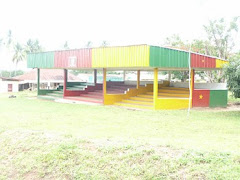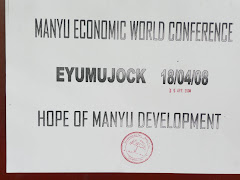 It will change Africa forever. Within the next couple of months four high-speed fibre optic cables will link up the east and west coasts of Africa to the rest of the world. It’s going to revolutionise how the continent connects and communicates in many ways – some we can imagine, some we can’t.
It will change Africa forever. Within the next couple of months four high-speed fibre optic cables will link up the east and west coasts of Africa to the rest of the world. It’s going to revolutionise how the continent connects and communicates in many ways – some we can imagine, some we can’t.Through the 20th century, Africa was regarded as a media backwater – little communication and even less content. In many African countries, up until the 90’s, TV was government owned, newspaper articles had to be approved by the state, and phone lines were provided by inefficient bureaucracies. Back then, an ambitious coup plotter only had to sever a few lines of communications infrastructure to render entire nations effectively deaf and dumb.
Then the revolution started. The first decade of the 21st century for Africans represented the advent and proliferation of the mobile phone. The private companies that spawned these mobile networks made huge profits and their Pan-African brands have become fixtures in the minds of Africans. Internet cafes mushroomed across the continent, PCs were imported in ever increasing numbers and remorseless software piracy ensured that basic productivity applications were available to most people.
One particularly illustrative anecdote is of a particularly challenging installation of an outdoor digital billboard in Nigeria’s capital city – Abuja. After my team and I spent a few days unsuccessfully dealing with technical problems, I called the Chinese supplier who asked if I had a sufficiently fast internet connection. We quickly connected our billboard to a recently acquired wireless broadband modem.
 Our Chinese technician, sitting in Shenzhen, took remote control of the billboard and undertook the process of fixing our media equipment – as if he was sitting next to me in the sweltering heat. Periodically, he would ask to see the billboard, and it would require only a few minutes to take a photo with my blackberry and email it to him. Barely a year earlier, we would have had to fly that Chinese engineer to Nigeria – securing a visa, buying an air ticket, and booking a hotel room with attendant expenses in time and money.
Our Chinese technician, sitting in Shenzhen, took remote control of the billboard and undertook the process of fixing our media equipment – as if he was sitting next to me in the sweltering heat. Periodically, he would ask to see the billboard, and it would require only a few minutes to take a photo with my blackberry and email it to him. Barely a year earlier, we would have had to fly that Chinese engineer to Nigeria – securing a visa, buying an air ticket, and booking a hotel room with attendant expenses in time and money.This experience represents the kind of productivity gains that can be obtained by the application of Internet technology. While there still remain real problems with electricity and transportation infrastructure, the mobile phone and the Internet have greatly reduced the barriers to entrepreneurship.
These technologies also have implications for governance and civil rights. Recently, a passerby recorded, on his mobile phone, an ugly episode involving Nigerian security forces physically abusing a woman. The video was quickly posted on YouTube and led to an unprecedented firestorm of criticism and legal action against the federal security services.
Because of technology, the negotiation between government and the governed has changed permanently. Now, it seems, the aforementioned coup-plotter who seeks to undemocratically change a government must do much more than seal off a few broadcast stations and newspapers to silence a nation. All of a sudden, every African is a journalist and there are a multitude of information paths into, out of and within the continent. Perverse political forces can no longer as readily control our collective mind.
Governments also will utilize information technology in interesting ways by creating more efficient systems for delivering healthcare, education and other public services. Successful public administration will, for a large part, be defined by how innovatively governments in Africa apply technology to simultaneously improve the quality of service deliver and fiscal position.
When not building outdoor media assets, I nurture two Internet properties – Alarena.com (West Africa’s largest matchmaking community) and Gbogbo.com (free local classifieds). Both are essentially online services that seek to fulfill specific needs in the life of the modern African who finds himself increasingly mobile, urban, global and internet savvy. The success of both services speaks to the ability of Africans to grab new technologies but speaks even more to a lack of incumbent alternatives.
Craigslist, gumtree and kijiji have proved that free local classifieds services are valuable, but my bet is that they are even more needed in the complete absence of old-fashioned yellow pages and telephone directories. The lack of fixed line phones, for further example, has effectively made Africa an almost purely mobile environment. The absence of retail bank branches, ATMs and credit cards have led us to a point where mobile payments are becoming mainstream in Africa before Europe and North America. Already, you can spend a cashless day in Nairobi and other African cities and pay for everything with your mobile phone.
It seems that Africa, by not investing in older systems can leapfrog entire models of communications and commerce and apply the newest and most cost-effective way of doing things. This unexpected advantage conferred by being late to the game is about to reveal itself with all its ramifications. While the first decade of the 21st century represented the mobile telephony revolution, the second decade will bring an explosion in mobile broadband.
A number of large infrastructure projects promise to deliver cheap and reliable broadband across the continent. One month ago, the SEACOM undersea fiber-optic cable landed in Kenya.
 As I write this, I have just learned that the Glo-1 undersea cable has arrived in Nigeria. In a couple of years, the O3b satellite network (O3b stands for “Other 3 billion”) sponsored by Google and HSBC will deliver “fiber-like” broadband connections to the continental interior.
As I write this, I have just learned that the Glo-1 undersea cable has arrived in Nigeria. In a couple of years, the O3b satellite network (O3b stands for “Other 3 billion”) sponsored by Google and HSBC will deliver “fiber-like” broadband connections to the continental interior.For Africans, these fiber and satellite networks represent massive pipes of information and, more importantly, liberty. Acting with these pipes are 3G and Wimax networks, low-cost open-source based netbooks and smartphones, and affordable software that will be delivered online as a service. In concert, by the end of the next decade, these technologies will reach the most remote corners of Africa – bringing with them opportunity and enlightenment.
But these systems must be supported by human capital of some form. With the failure of the public school systems on the continent, many young Africans programmers and engineers will teach themselves complex skills. It is unclear whether an army of African autodidacts will be sufficient or required to power this transformation. However, the very tools of software creation are becoming more simple and modular as to one day make creativity more important than brute technical ability. Should this be the case, Africa will thrive in the new world – and likely be more of a driver than a follower of new models for organising economies and societies.
Sim Shagaya is a serial technology and media entrepreneur who shares his time between Nigeria and South Africa. He has worked for Google, RealNetworks, Microstrategy and other tech leaders and holds degrees from George Washington U, Dartmouth and Harvard.




























No comments:
Post a Comment